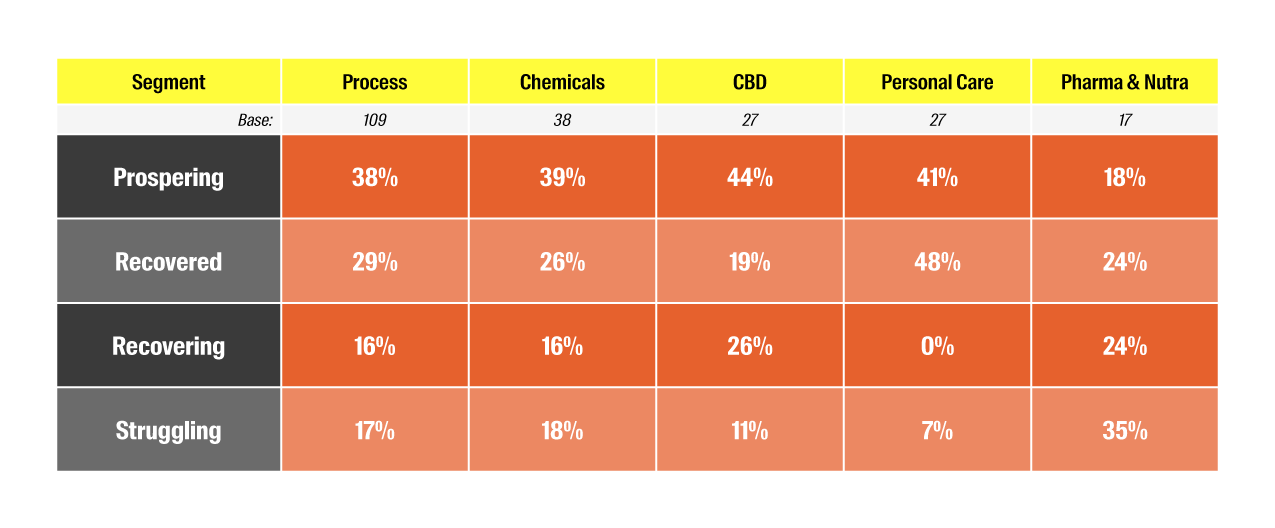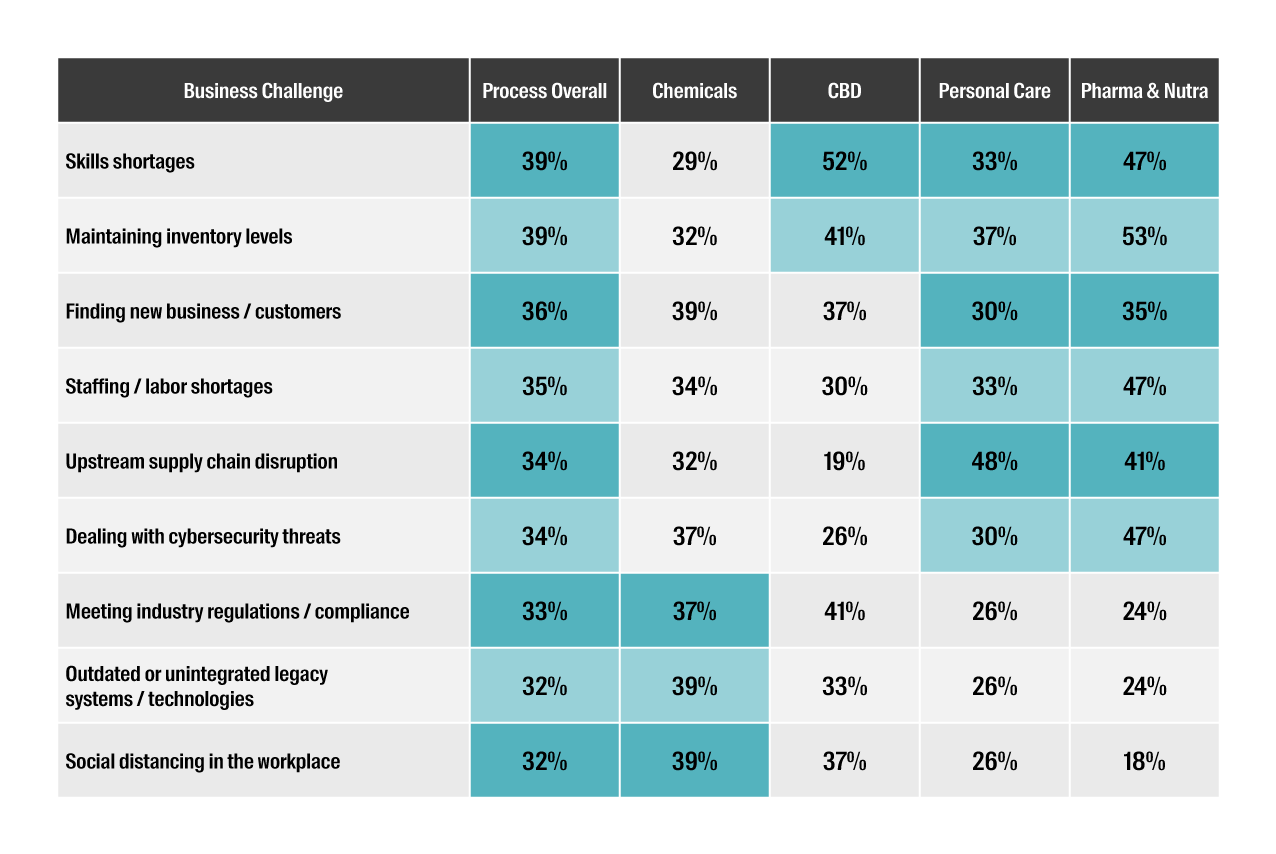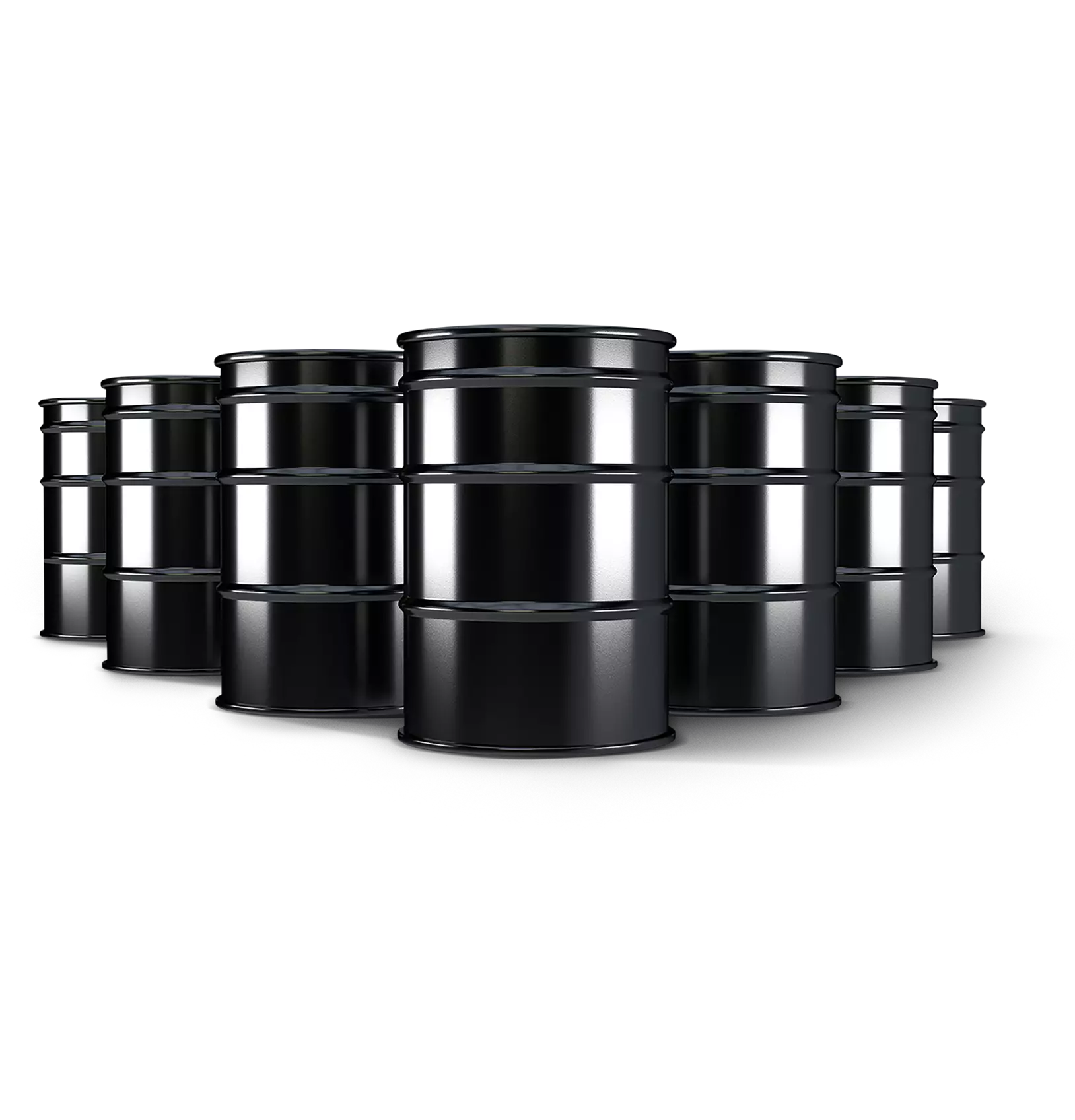80% of Process Manufacturers Predict Revenue Growth in 2022
80% of Process Manufacturers Predict Revenue Growth in 2022
80% of Process Manufacturers Predict Revenue Growth in 2022
2 Dic 2021
 Daniel Erickson | Senior Product Manager
Daniel Erickson | Senior Product Manager
After a challenging couple of years, confidence has returned to the process manufacturing sector—with 80% of organizations predicting their sales and revenue will increase in the next 12 months. This sense of buoyancy follows a stronger year for process manufacturing, in which 60% of companies saw their revenue increase in comparison to 2020.
These findings were obtained from new research commissioned by Aptean to understand how manufacturers have managed market turbulence and are reconfiguring their business strategies for the year ahead. The study featured 275 North American manufacturers including more than 100 process manufacturers across sub-sectors such as chemicals, CBD, personal care, pharmaceuticals and nutraceuticals.
In addition to providing industry-wide insights, our research revealed that manufacturers with customers in categories where sales were strong during 2020/2021 are even more optimistic about their 2022 revenue prospects. For example, 89% of CBD manufacturers and 89% of personal care product manufacturers anticipate higher revenue and sales next year.
of both CBD manufacturers and personal care product manufacturers anticipate higher revenue and sales in 2022
How Quickly Are Process Manufacturers Returning to Prosperity?
To benchmark performance across the process manufacturing sector, Aptean analyzed the financial data provided by our research participants and categorized each business into one of four segments: struggling, recovering, recovered and prospering.
Encouragingly, 67% of process manufacturers describe themselves as either prospering or recovered from any economic setbacks experienced in 2020/21. And looking at the four key sectors we surveyed, we can see that the chemicals and CBD sub-sectors follow a similar trend to the overall process industry results.

However, there’s greater caution in the personal care sector, where more manufacturers class themselves as recovered than prospering. This could be related to beauty and personal hygiene sales being affected by changing consumer purchasing habits.
While people have continued to buy personal care items in large volumes over the past 12-18 months, the type of goods they are purchasing has shifted. Sales of lipsticks have fluctuated, for example, due to people wearing face masks. Facial skincare product sales have increased meanwhile, as some mask-wearers have been affected by acne round their mouth and chin.
The haircare market has also evolved, with eco-conscious consumers driving demand for waterless hair products.
Many personal care manufacturers have also been impacted by brands pivoting to an ecommerce-first and/or D2C sales strategy to maintain customer momentum. But with online sales growing by 39% year-on-year in the first quarter of 2021 and predictions that US ecommerce spending will top $1 trillion in 2022, demand for personal care goods remains strong in this ‘new normal’—supporting manufacturers’ sales optimism for the year ahead.
What Could Limit Process Manufacturing Revenue Growth in 2022?
While confidence levels are high heading into 2022, process manufacturers are also realists—and our research revealed a number of barriers that organizations believe could stand between themselves and predicted revenue growth.
The number one barrier to progress identified in our study was being caught up in day-to-day demands, with 40% of process manufacturers feeling this could take the focus away from bigger picture objectives. However, half of all process manufacturers plan to automate more aspects of their operation in the next three years to address this issue and drive business growth.
of all process manufacturers plan to automate more aspects of their operation in the next three years
While digital transformation is high on the medium-term agenda however, technology was another major reason why process manufacturing organizations might not achieve their 2022 goals. 3 in 10 manufacturers stated that complex system integrations could interfere with their company growth, while a quarter (24%) worry about finding the right technology solution to drive systemic change.
To overcome technical complexity and accelerate growth in 2022, process manufacturers will need to invest in solutions that drive business-wide change, as part of a holistic technology strategy. And promisingly, in order to achieve this, 81% of process manufacturing companies already have a digital transformation roadmap in place for some or all departments, while a further 13% have early plans to explore digital transformation.
Increasing Revenue Through Manufacturing ERP Software Investment
With a clear focus on digital transformation to drive sales and revenue growth over the next 12 months, process manufacturers are looking at technologies that drive end-to-end operational improvements.
Process manufacturing ERP software enables companies to ditch disparate systems and use one software platform to find improvements and efficiencies—even if the areas that require optimization are diverse.
As part of our research, Aptean asked process manufacturers which 2022 business challenges they believed could be solved through digital transformation. The results included everything from upstream supply disruption to social distancing in the workplace.

The best process manufacturing ERP systems have the power to optimize each of these areas, without the technical complexities associated with integrating multiple legacy systems, which was highlighted as an area of concern in our earlier research findings.
Process manufacturers are realizing that even seemingly ‘people’ areas such as managing skills/staff shortages and finding new business can be revolutionized through ERP software, by automating previously manual processes to reduce the size of workforce and breadth of skills needed to run an efficient operation.
And manufacturing ERP platforms with built-in business intelligence tools can perform analyses on the most profitable jobs, to help process manufacturers focus new business development around companies with high profit yield potential.
Aptean Process Manufacturing ERP: Driving Revenue Growth in 2022
With optimism levels rising and many organizations returning to prosperity, the process manufacturing industry is ripe for change in 2022. And the development of digital transformation strategies will drive this change; provided companies choose technology that can deliver end-to-end optimization and improvement.
Aptean Process Manufacturing ERP software has been specifically developed to support batch manufacturers across sub-sectors including cannabis manufacturing, chemicals manufacturing, personal care manufacturing and pharma/nutraceutical manufacturing.
Our cloud-based technology enables process manufacturers to produce recipe and formula-based products to consistently high standards, with full traceability, industry compliance and real-time inventory management. To help process manufacturers improve productivity, increase output, and enhance profit margins in 2022.
Get in touch with our team of process manufacturing experts to book your no obligation Aptean Process Manufacturing ERP demo.
¿Todo listo para transformar tu negocio?
Tenemos las soluciones ERP especializadas que necesitas para superar los desafíos de tu sector.



